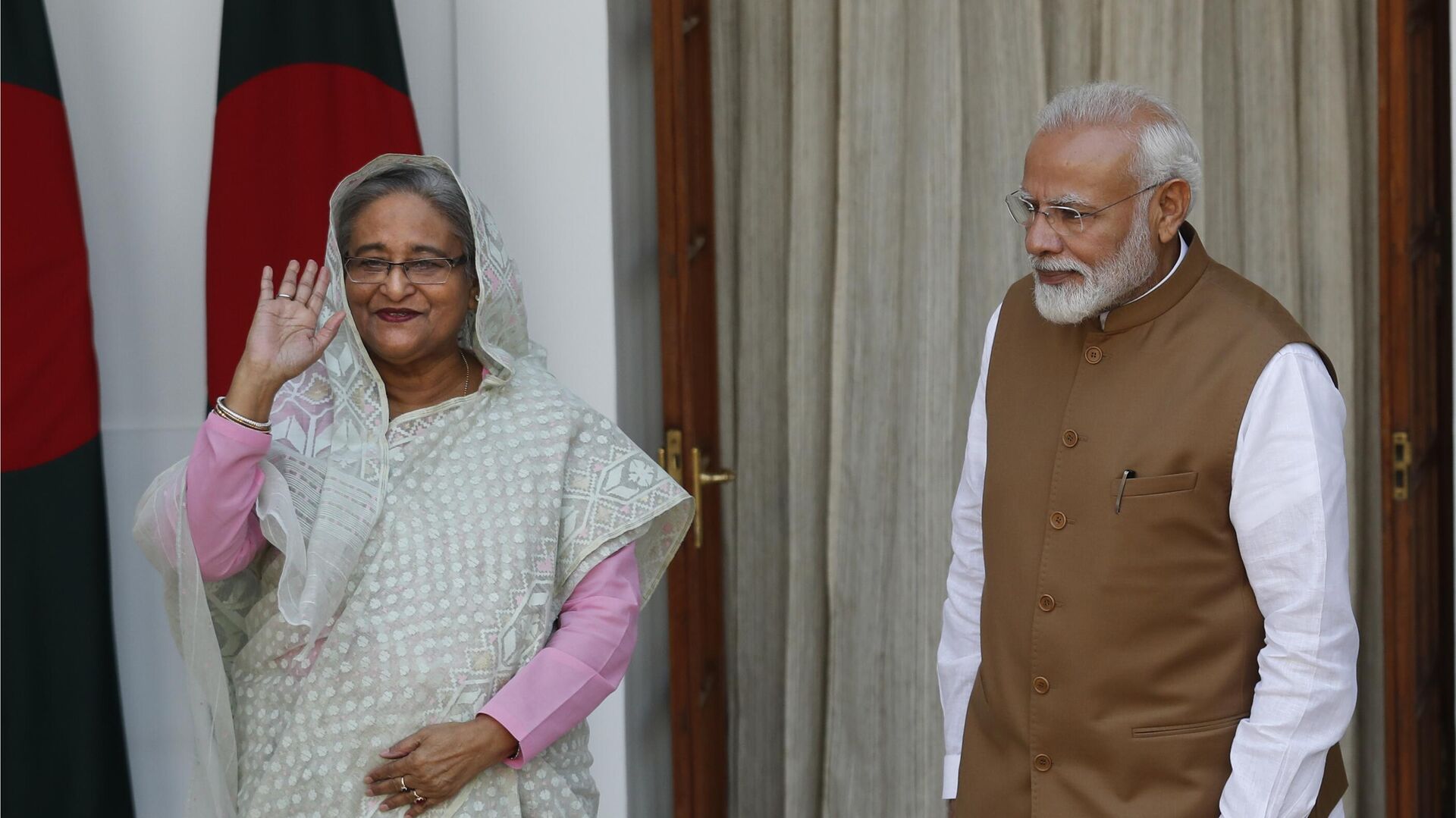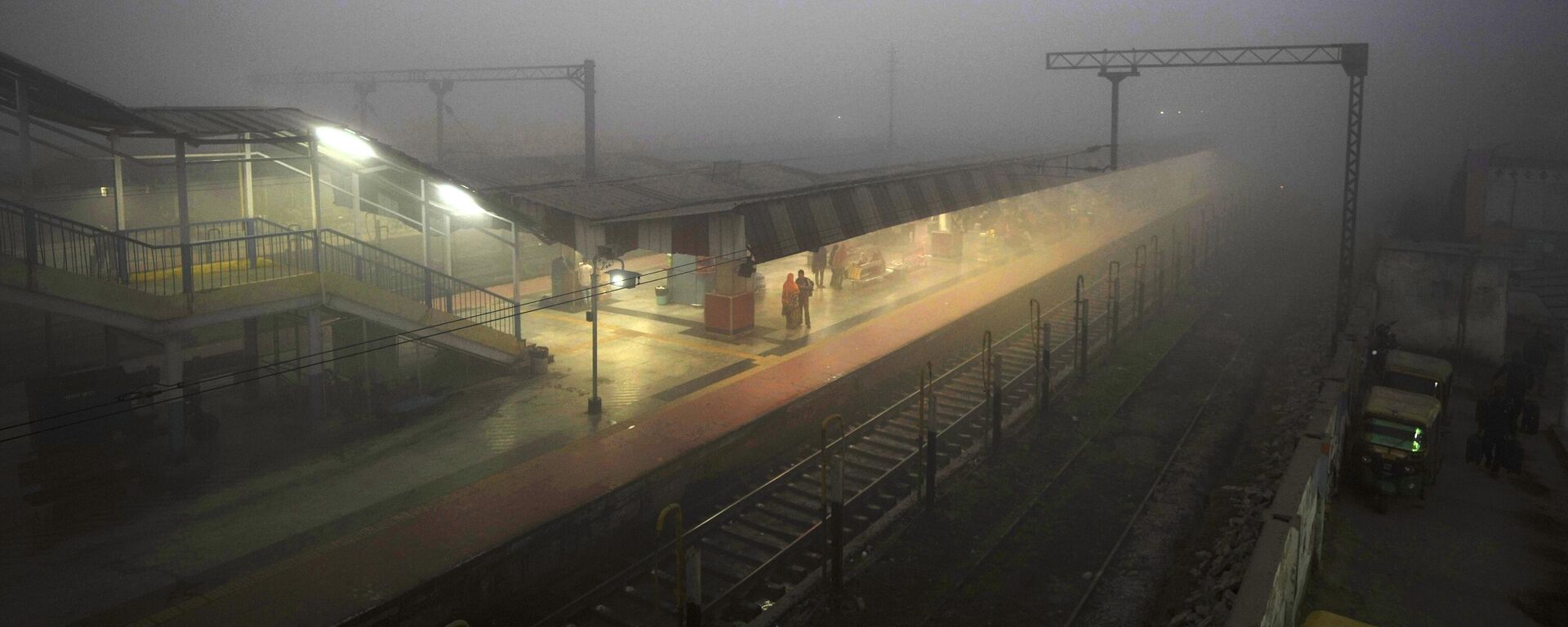https://sputniknews.in/20240208/bangladesh-affirms-india-first-policy-amid-deepening-convergences-in-south-asia-6482492.html
Bangladesh Affirms India-First Policy Amid Deepening Convergences in South Asia
Bangladesh Affirms India-First Policy Amid Deepening Convergences in South Asia
Sputnik India
At a time when the Maldives’ new President Mohamed Muizzu has been seeking to draw down its ties with New Delhi, another south Asian country Bangladesh has reinforced India’s status as a priority partner.
2024-02-08T14:50+0530
2024-02-08T14:50+0530
2024-02-08T14:50+0530
sputnik opinion
india
bangladesh
new delhi
ministry of external affairs (mea)
bimstec
mohamed muizzu
ajit doval
s. jaishankar
indian ocean
https://cdn1.img.sputniknews.in/img/07e7/0c/14/5898143_0:0:2811:1581_1920x0_80_0_0_2172a9f740ad34d3f5482677c171d8a5.jpg
Bangladesh's Foreign Minister Hasan Mahmud met India's External Affairs Minister S Jaishankar and National Security Advisor (NSA) Ajit Doval in New Delhi on Wednesday, in his first outgoing bilateral trip since assuming office last month. A statement by India's Ministry of External Affairs (MEA) underlined that both the countries have expressed a commitment to "promote sub-regional cooperation" within regional frameworks such as Bay of Bengal Initiative for Multi-Sectoral Technical and Economic Cooperation (BIMSTEC), Indian Ocean Rim Association (IORA) and Bangladesh Bhutan India Nepal (BBIN) network. All these groupings are geared towards bolstering regional connectivity in the South Asian region. India Remains a 'Strong Pillar' of Bangladesh's Foreign Policy The Awami League official noted that a "discussion and exchange of views on various aspects of our bilateral relationship, including economic and social development cooperation, bodes well in terms of further bolstering the overall relationship". Citing the official statement, the Ambassador said that both the leaders also discussed some of the frictional points in the bilateral ties, including the killings at the India-Bangladesh border and the issue of sharing of the waters of the Teesta River. A statement by Dhaka also said that Mahmud urged New Delhi to “withdraw tariff and non-tariff barriers for Bangladesh's exports and ensure uninterrupted supply of essential commodities to maintain price stability especially during Ramadan”.India, Bangladesh Want a 'Peaceful and Stable South Asia', Ex-PM Aide Says The former PM advisor underlined that India has been "supportive" of Bangladesh's developmental and economic progress. He said that the visit served as an opportunity for Mahmud, formerly the country's information minister, to "familiarise" himself with his Indian counterparts to cultivate a "strong working relationship".
https://sputniknews.in/20231101/whats-the-significance-of-3-new-projects-in-bangladesh-built-with-indias-help-5180410.html
india
bangladesh
new delhi
indian ocean
us
south asia
indo-pacific
maldives
Sputnik India
feedback.hindi@sputniknews.com
+74956456601
MIA „Rossiya Segodnya“
2024
Dhairya Maheshwari
https://cdn1.img.sputniknews.in/img/07e6/0c/13/138962_0:0:641:640_100x100_80_0_0_2cb44360dbcdf6d84bf4b299cd045917.jpg
Dhairya Maheshwari
https://cdn1.img.sputniknews.in/img/07e6/0c/13/138962_0:0:641:640_100x100_80_0_0_2cb44360dbcdf6d84bf4b299cd045917.jpg
News
en_IN
Sputnik India
feedback.hindi@sputniknews.com
+74956456601
MIA „Rossiya Segodnya“
Sputnik India
feedback.hindi@sputniknews.com
+74956456601
MIA „Rossiya Segodnya“
Dhairya Maheshwari
https://cdn1.img.sputniknews.in/img/07e6/0c/13/138962_0:0:641:640_100x100_80_0_0_2cb44360dbcdf6d84bf4b299cd045917.jpg
india bangladesh relations, india bangladesh border, india bangladesh news, bangladesh news, bangladesh foreign minister’s visit, teesta water sharing issue, bsf border killings, india bangladesh trade, us regime change, us regime change in bangladesh, sheikh hasina, bnp, bangladeshi refugees in india
india bangladesh relations, india bangladesh border, india bangladesh news, bangladesh news, bangladesh foreign minister’s visit, teesta water sharing issue, bsf border killings, india bangladesh trade, us regime change, us regime change in bangladesh, sheikh hasina, bnp, bangladeshi refugees in india
Bangladesh Affirms India-First Policy Amid Deepening Convergences in South Asia
At a time when the Maldives’ new President Mohamed Muizzu has been seeking to draw down its ties with New Delhi, another South Asian country Bangladesh has reinforced India’s status as a priority partner.
Bangladesh's Foreign Minister Hasan Mahmud met India's External Affairs Minister S Jaishankar and National Security Advisor (NSA) Ajit Doval in New Delhi on Wednesday, in his first outgoing bilateral trip since assuming office last month.
A statement by Bangladesh's foreign ministry said that the visit is aimed at fostering a "deeper and higher quality relation" between Dhaka and New Delhi, Bangladesh's biggest development partner and its closest political and security partner.
A statement by India's Ministry of External Affairs (MEA) underlined that both the countries have expressed a commitment to
"promote sub-regional cooperation" within regional frameworks such as
Bay of Bengal Initiative for Multi-Sectoral Technical and Economic Cooperation (BIMSTEC),
Indian Ocean Rim Association (IORA) and
Bangladesh Bhutan India Nepal (BBIN) network. All these groupings are geared towards bolstering regional connectivity in the South Asian region.
India Remains a 'Strong Pillar' of Bangladesh's Foreign Policy
Ambassador Muhammad Zamir, who heads International Affairs Sub-committee of Awami League and is a former secretary in Bangladesh's foreign ministry, told Sputnik India that the Mahmud's maiden bilateral visit affirmed the fact that New Delhi continued to remain as a "strong pillar" of Dhaka's foreign policy.
"There is a great deal of convergence on both the countries' respective outlook towards South Asia and how to keep it free from extraneous influence. Both the countries back an economic integrated, connected and a peaceful South Asia for the mutual benefit of both the nations," Zamir stated.
The Awami League official noted that a "discussion and exchange of views on various aspects of our bilateral relationship, including economic and social development cooperation, bodes well in terms of further bolstering the overall relationship".
Citing the official statement, the Ambassador said that both the leaders also discussed some of the frictional points in the bilateral ties, including the killings at the India-Bangladesh border and the issue of sharing of the waters of the Teesta River.
A statement by Dhaka also said that Mahmud urged New Delhi to “withdraw tariff and non-tariff barriers for Bangladesh's exports and ensure uninterrupted supply of essential commodities to maintain price stability especially during Ramadan”.
"I am sure both the countries will be able to resolve these issues. India has been viewed as a good neighbour and a good friend of Bangladesh and it would continue to remain so," Zamir asserted.
India, Bangladesh Want a 'Peaceful and Stable South Asia', Ex-PM Aide Says
Iqbal Sobhan Chowdhury, a former advisor to Bangladesh's Prime Minister Sheikh Hasina, told Sputnik India both the countries were in favour of a "peaceful" South Asia where sovereignty of every nation is respected.
"We want a peaceful South Asian zone where every country could participate in the development and progress of the region. Every nation, including extra-regional powers, should honour the sovereignty of our countries," he stated.
The former PM advisor underlined that India has been "supportive" of Bangladesh's developmental and economic progress.
He said that New Delhi stood by Bangladesh and lauded its democratic processes at a time when the US-led western powers were critical of the recently-concluded federal election last month.
"India understands that Bangladesh's graduation to the status of a developed nation directly benefits its strategic priorities in South Asia. An economically and a politically stable Bangladesh is in India's national interest," Chowdhury remarked.
He said that the visit served as an opportunity for Mahmud, formerly the country's information minister, to "familiarise" himself with his Indian counterparts to cultivate a "strong working relationship".



